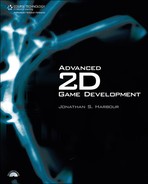Book Description
Get ready to build a complete, professional-quality 2D game engine from start to finish! "Advanced 2D Game Development" is your comprehensive guide to 2D game development using DirectX in the C++ programming language. Each chapter of the book covers one major component of the game engine, including 2D and 3D rendering, DirectInput, FMOD audio, game math, multi-threading, Lua scripting, and more, and the game engine is built upon chapter by chapter. Through the creation of the game engine, you'll learn step by step how to write solid code for multiple compilers, adding to the code as you work through each chapter. And every chapter includes an example game that illustrates the new techniques being taught. Perfect for game programming students and professionals alike, this book is your ultimate guide to awesome 2D game development.
